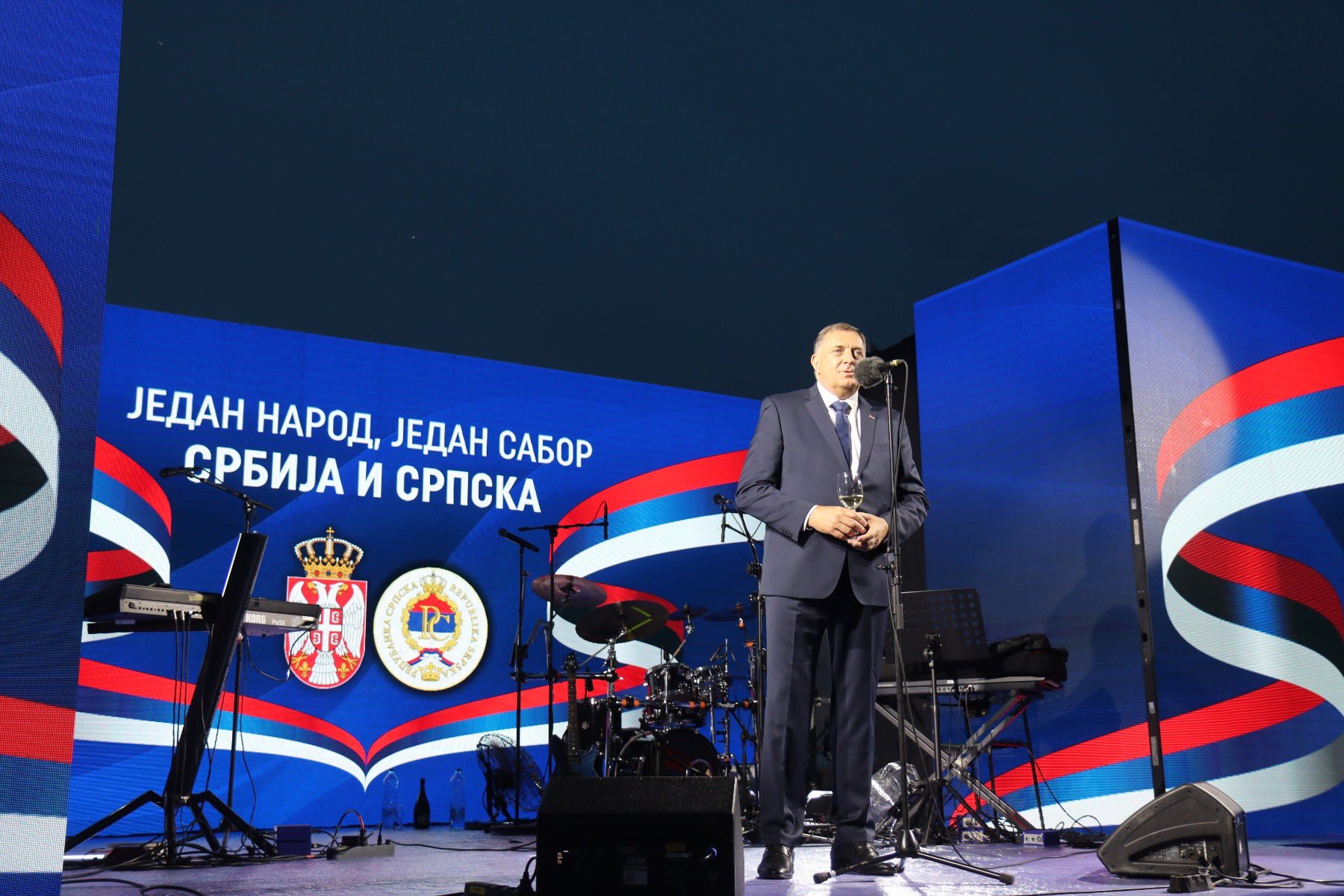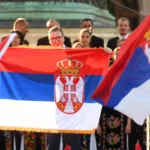The absolute majority of experts believe the collapse of Bosnia and Herzegovina is nowhere near. It is believed that although the leaders of Republika Srpska declare preparations for the secession, their real goal is only greater ‘de facto’ independence for this entity within BiH, not an actual disintegration of the country.
But is it really the case?
“Peaceful Divorce”
It should be recalled, at what stage the process of RS’s secession currently stands.
Late May, RS President Milorad Dodik said the Serbian people could no longer live in Bosnia and Herzegovina because of what “the Bosnians did with the Srebrenica Resolution.” He said that “in the next 30 days” an agreement on peaceful disengagement would be put forward. “We start today with an official decision on the request for peaceful disengagement. We will propose first to clarify the political competences related to the entities, as well as to preserve and leave the current model of the functioning of the economy and adapt it to that of peaceful disengagement over several years,” Dodik said back then.
On May 30, the Government of Republika Srpska created a Working Group for the preparation of the draft Agreement on the Peaceful Secession of Republika Srpska from the Federation of Bosnia and Herzegovina. The group included the Republika Srpska Minister of Justice and Deputy Prime Minister, Minister of Internal Affairs, Prosecutor General, Director of the Republican Administration for Geodetic and Property Legal Issues, Tax Administration chief, and other officials from the entity. The group was tasked with drawing up a proposal for the Agreement on the Peaceful Secession of Republika Srpska from Bosnia and Herzegovina, which the RS Government would then forward to the RS People’s Assembly.
Setting up the Working Group has become a key real step over the recent period on the way toward the breakup of BiH.
The next move, which should demonstrate the resolve of Bosnian Serbs, should be publishing the draft Agreement on Peaceful Secession and tabling the document in Parliament (National Assembly) of Republika Srpska. Dodik claims the text will have been conceived by late June.
However, in parallel lines, the RS leadership may initiate other secession processes.
A few days ago, in an interview with the Russian agency TASS on the sidelines of the St. Petersburg International Economic Forum, Milorad Dodik announced a referendum on the RS independence, although he stopped short of naming the date – even a tentative one.
In the same interview, the RS leader also announced a strategic goal. This is not just the exit from BiH, but also the eventual accession to Serbia. “Yes, most likely, of course, it would be absolutely historically justified for the countries in which the majority of the population is the Serbian people to unite into a single structure and commonwealth, but this is a task for future generations and political decisions by both countries,” he said.
Given Dodik’s appeal to the “next generations” and the absence of any specific proposals for the unification of Republika Srpska and Serbia into a single state, it is not worth expecting any practical implementation of the idea anytime soon.
But the same can’t be said about the idea of pulling RS from BiH, which has already begun to turn into a concrete action plan, with its first point being the preparation of the Agreement on the peaceful secession of Republika Srpska from Bosnia and Herzegovina.
In view of all these circumstances, the text of the announced Agreement will actually be drafted rather soon. But what next?
The three scenarios
There are several scenarios for further developments.
1. The draft Agreement on Peaceful Secession, developed by the Working Group, will be highlighted the most.
1.1. The document will be used by Bosnian Serbs in political rhetoric to put pressure on the international community and government in Sarajevo. Although the declared goal of the effort will be pulling RS from BiH thus breaking the country up, in fact RS will bargain for having its rights expanded, stripping BiH’s central authorities of power, and abolishing the position of a High Representative of the international community. So this will be a struggle of Bosnian Serbs for revisiting the so-called “real” Dayton Peace Agreement and implementing its provisions in their literal, initial version, taking no account of interpretations and additional agreements that followed.
1.2. At the same time, a negotiation process will be initiated with the leaders of the Federation of Bosnia and Herzegovina regarding the “peaceful partition of BiH”.
2. The draft Agreement on Peaceful Secession will be adopted by the People’s Assembly of Republika Srpska. Scenario No. 1 will be pursued, but in the case clause 1.1. comes into force, it will no longer be mere pressure, but an actual ultimatum. If clause 1.2. comes to life, contacts of Bosnian Serbs with individual representatives of Bosnian Croats from the Federation of BiH cannot be ruled out.
In both scenarios, the number of areas will increase in which Republika Srpska will not cooperate with the central authorities of BiH. These include holding elections, managing the entity’s real estate, taxes, and security forces…
3. The draft Agreement on Peaceful Secession will be adopted by the People’s Assembly of Republika Srpska. Next, RS will officially launch the process of dividing BiH into RS and FBiH.
The mechanism of this separation is currently unclear. It is believed that in this case, it will be a matter of revising or even terminating the Dayton Peace Agreement of 1995.
Accordingly, although Republika Srpska constantly insists that it stands for peace and does not seek any instability, the beginning of the process of REAL, legitimate separation of Bosnia and Herzegovina (scenario 3) will imply anything but lasting peace or guaranteed stability.
At the same time, the previous two scenarios, albeit increasing regional turbulence and destabilizing BiH, will keep the situation within the framework of political and legal debates and disputes, without transitioning to higher levels of destabilization.
Moscow’s game
How likely are each of the three scenarios?
In order to foresee further developments, it is necessary to also look beyond what is happening precisely in Republika Srpska and what its leaders are declaring. The point is to closely watch what the closest allies of the Bosnian Serbs, Dodik’s “friends”, are saying – and doing.
It is about the leaders of Russia and Serbia.
In view of the latest public statements, neither Moscow nor Belgrade is currently ready to unequivocally and openly support the exit of Republika Srpska from Bosnia and Herzegovina and the ultimate breakup of the latter.
This is what Vladimir Putin said at a meeting with Milorad Dodik in St. Petersburg a few days ago: “You know our position regarding the Dayton Agreements, it remains unchanged: only those powers that were recorded in these international legal documents are grounds for not simply preserving the situation as it is, but also for developing and strengthening it. We will contribute to this end in every possible way.”
Thus, the Russian leader clearly outlines Russia’s current interest – greater independence and greater weight for Republika Srpska within Bosnia and Herzegovina.
The Kremlin’s motivation is clear – RS should block BiH’s Euro-Atlantic integration, prevent the introduction of full-fledged sanctions against Russia, and generally oppose any anti-Russian moves at the level of Bosnia and Herzegovina.
It is worth noting that during his last visit to Russia, Milorad Dodik emphasized: “As long as there is Republika Srpska, Bosnia and Herzegovina will not join NATO.” “If the government of BiH respects its regulations and procedures, it will realize that it has no legitimate opportunity to join NATO,” he said on the sidelines of the St. Petersburg International Economic Forum.
Belgrade’s game
Serbia’s policy toward Republika Srpska is based on a completely different premise.
For Belgrade, the No. 1 priority now is to rally all Serbs – not into one state, as it was in the Milosevic days, but into one cross-border community, the “Serbian World”. The political, humanitarian, and mental unity of the Serbian people, regardless of their country of residence, is a critical task for the government of Serbia, on which they have been working.
The All-Serbian Council proves that this policy is being actively implemented.
The Declaration adopted by Parliament says a lot of the importance of observing the Dayton Agreement and preventing its violation; emphasizes the broad powers – the “high level of autonomy” – of Republika Srpska guaranteed by Dayton; and criticizes the appointment of the High Representative, which was allegedly in breach of the Dayton Agreement. Support for the military neutrality of Republika Srpska is emphasized separately. But the document adopted by the All-Serbian Parliament, which must be approved by the People’s Assemblies of RS and Serbia within three months, expresses no support for the withdrawal of Republic of Srpska from Bosnia and Herzegovina.
Aleksandar Vučić is interested in building up the “Serbian World”, but at the same time he does not want to take drastic steps that would be perceived by the international community as support for separatists. Therefore, Belgrade says “yes” to as much independence as possible for Republika Srpska as part of Bosnia and Herzegovina and the unity of Serbs from both banks of the Drina, but it shows no support for the BiH disintegration.
BiH disintegration is off the table
Considering the position of Belgrade and Moscow, Banja Luka will also act. Therefore, the most realistic can be considered the scenarios that foresee the struggle for increasing the rights of the RS within BiH, the political confrontation between the Bosnian Serbs, on the one hand, and official Sarajevo and the collective West, on the other. That is, scenarios No. 1 and No. 2, if we speak in the terms of this text.
Despite Dodik’s statements, actual disintegration of Bosnia and Herzegovina is now off the table.
However, today’s world is so unpredictable that no one would dare guarantee that further developments in the country would go along a “smooth” path.



